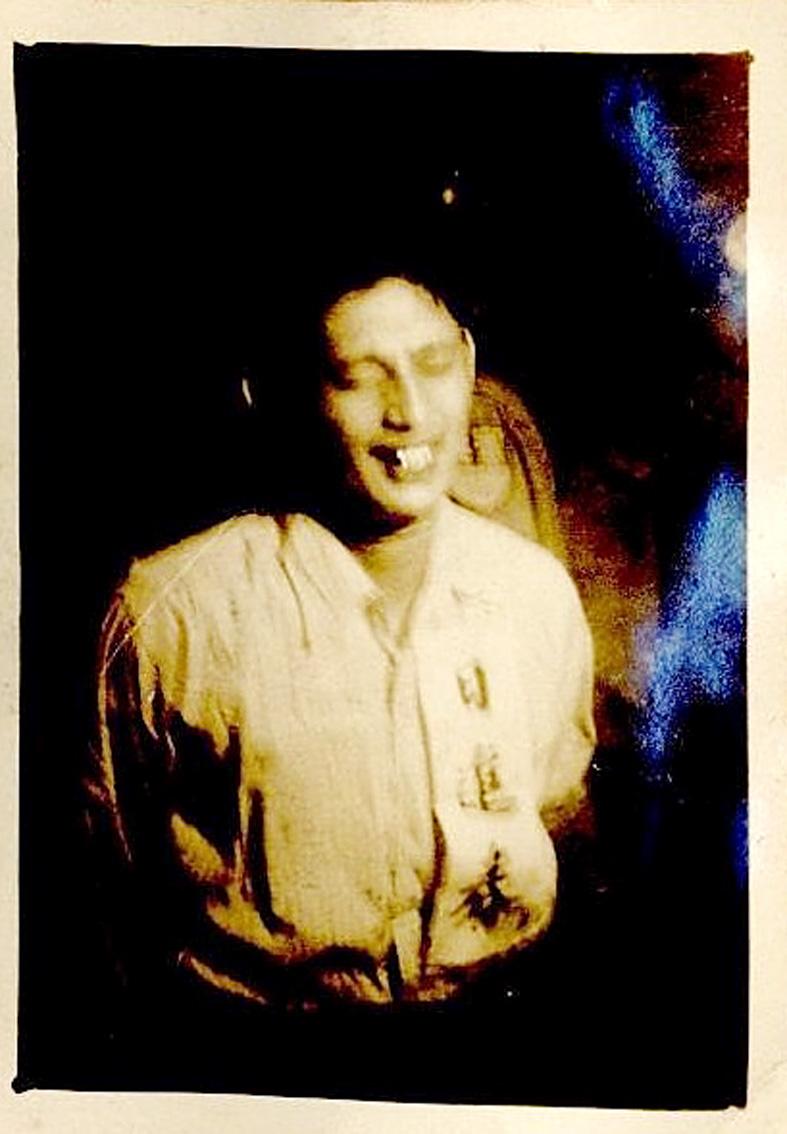Jih Chin-chun (日進春), a member of the Saisiyat community, was the first Taiwanese Aborigine to fall victim to the White Terror era when he was shot by Chinese Nationalist Party (KMT) military police at a riverbank in Taipei 69 years ago, the Transitional Justice Commission said yesterday.
Jih has been memorialized by a picture, in which he is shown laughing, captured just before he was executed on Aug. 29, 1952, the commission said.
The commission said that it has asked researchers to compile a booklet on transitional justice measures focusing on Taiwan’s Aborigines, including Jih, as well as stories of Paiwan youth Lai Hung-man (賴紅炎) and other Aboriginal victims of the period.

Photo courtesy of the Transitional Justice Commission
The commission said it hopes later generations of Aborigines can learn about the injustices their communities faced during the period.
Jih was shot five times, and his body was left on a pile of corpses in the Liuzhangli (六張犁) area of Taipei, forgotten until the present day, the commission said.
Jih’s father, Jih A-kuai (日阿拐), was the head of a Saisiyat community and went into hiding to avoid capture during a rebellion against the Japanese in 1902, in what is now Miaoli County’s Nanjhuang Township (南庄), it said.
Jih A-kuai died a year later in what now is Luchang Borough (鹿場) of Hsinchu County’s Jhubei City, it said.
Jih Chin-chun was detained after being involved in the case of Chang Yan-mei (張燕梅), it said. Chang was a teacher at Taipei’s Penglai Elementary School and a member of the Taipei Workers’ Committee, a group of Chinese Communist Party sympathizers planted within various government agencies.
Jih Chin-chun once gave Chang an autobiography, but he never participated in any committee meetings, the commission said.
Although he was able to avoid Jih Chin-chun’s fate, Lai had been wrongly accused of dissidence due to his random jottings while he was a student, in which he would raise questions about how to improve the futures of fellow Aborigines, it said.
He was eventually taken for questioning while he was teaching at Taitung’s Jialan Elementary School in 1965 and detained for several days, it said.
The White Terror era refers to the suppression of political dissidents including the 228 Incident, an uprising that began on Feb. 27, 1947, which was brutally suppressed by the then-KMT regime. The government subsequently imposed martial law, which was lifted on July 15, 1987.

Taiwan has received more than US$70 million in royalties as of the end of last year from developing the F-16V jet as countries worldwide purchase or upgrade to this popular model, government and military officials said on Saturday. Taiwan funded the development of the F-16V jet and ended up the sole investor as other countries withdrew from the program. Now the F-16V is increasingly popular and countries must pay Taiwan a percentage in royalties when they purchase new F-16V aircraft or upgrade older F-16 models. The next five years are expected to be the peak for these royalties, with Taiwan potentially earning

POSITIVE DEVELOPMENT: Japan and the US are expected to hold in-depth discussions on Taiwan-related issues during the meeting next month, Japanese sources said The holding of a Japan-US leaders’ meeting ahead of US President Donald Trump’s visit to China is positive news for Taiwan, former Japan-Taiwan Exchange Association representative Hiroyasu Izumi said yesterday. After the Liberal Democratic Party’s landslide victory in Japan’s House of Representatives election, Japanese Prime Minister Sanae Takaichi is scheduled to visit the US next month, where she is to meet with Trump ahead of the US president’s planned visit to China from March 31 to April 2 for a meeting with Chinese President Xi Jinping (習近平). Japan and the US are expected to hold in-depth discussions on Taiwan-related issues during the

‘LIKE-MINDED PARTNER’: Tako van Popta said it would be inappropriate to delay signing the deal with Taiwan because of China, adding he would promote the issue Canadian senators have stressed Taiwan’s importance for international trade and expressed enthusiasm for ensuring the Taiwan-Canada trade cooperation framework agreement is implemented this year. Representative to Canada Harry Tseng (曾厚仁) in an interview with the Central News Agency (CNA) said he was increasingly uneasy about Ottawa’s delays in signing the agreement, especially as Ottawa has warmed toward Beijing. There are “no negotiations left. Not only [is it] initialed, we have three versions of the text ready: English, French and Mandarin,” Tseng said. “That tells you how close we are to the final signature.” Tseng said that he hoped Canadian Prime Minister Mark Carney

STAY IN YOUR LANE: As the US and Israel attack Iran, the ministry has warned China not to overstep by including Taiwanese citizens in its evacuation orders The Ministry of Foreign Affairs (MOFA) yesterday rebuked a statement by China’s embassy in Israel that it would evacuate Taiwanese holders of Chinese travel documents from Israel amid the latter’s escalating conflict with Iran. Tensions have risen across the Middle East in the wake of US and Israeli airstrikes on Iran beginning Saturday. China subsequently issued an evacuation notice for its citizens. In a news release, the Chinese embassy in Israel said holders of “Taiwan compatriot permits (台胞證)” issued to Taiwanese nationals by Chinese authorities for travel to China — could register for evacuation to Egypt. In Taipei, the ministry yesterday said Taiwan